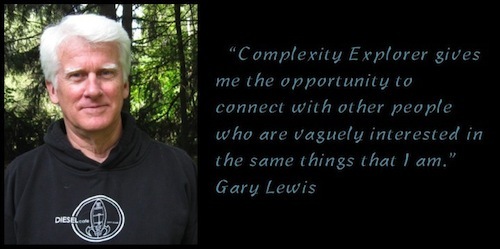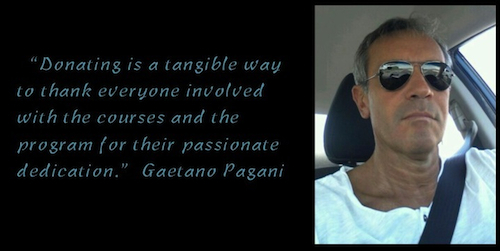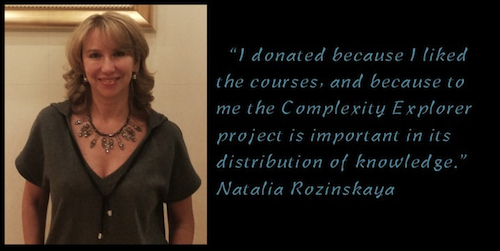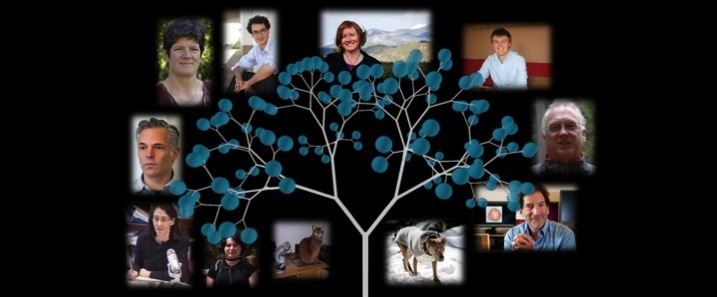
- 02 Dec 2015
The thousands of complexity scholars who take part in our courses not only enrich their own knowledge, they also provide pivotal support to Complexity Explorer through donations, t-shirt purchases, and volunteer time. We reached out to a few exceptional supporters to learn a little more about the people coming to learn and the reasons why they choose to support our project. Read on for more about Gary, Gaetano and Natalia. Click here if you would like to join them in supporting our course and platform development.

Gary Lewis is retired and has spent the last eight years devoting himself to the study of physics. He spoke with us about his love of physics and what drives his search for knowledge these days.
“Physics is a gorgeous field, with many puzzles, much disagreement, and a strong melding of science, mathematics, and philosophy. Where else can one consider whether spacetime is emergent? Or whether space at Planck scale is fractal? These are gigantic questions that are just plain fun. So that's what I do, but it's a pretty isolated endeavor, which is one reason I appreciate Complexity Explorer so much, because it gives me the opportunity to connect with other people who are vaguely interested in the same things that I am” – Gary Lewis.
Natalia Rozinskaya, from Russia with a PhD in Economics, is a lecturer teaching World Economic History at Moscow University and was interested in general laws of dynamical systems. This interest led her to take both "Introduction to Complexity" and "Introduction to Dynamical Systems and Chaos". The existence of universal laws surprised her. Taking the courses was also a great way for her to work on her English.
We also heard from Gaetano Pagani, currently a business manager in Italy who worked in the Statistics Department of the Faculty of Economics at the University of Parma in the 1980s. Gaetano discovered Complexity Explorer through his son Andrea. Andrea attended the Santa Fe Institute’s Complex Systems Summer School in 2013 and urged his father to enroll in “Introduction to Complexity”. Gaetano's skepticism was swept away in a whirlwind affair with Complexity Explorer that has led him to take three more courses (Introduction to Dynamical Systems and Chaos, Nonlinear Dynamics, and Fractals and Scaling) and two tutorials (Maximum Entropy Methods, and Random Walks).
When Gary came across Complexity Explorer he thought it would be fun to keep his mind active and be exposed to new ideas during his retirement. He has also taken all of the courses we offer.
“I’ve been struck by the quality of the instructors. They uniformly seem very knowledgeable in their fields of specialty, with considerable teaching skills in what must be a complicated educational format, and obvious empathy for diverse student backgrounds” – Gary Lewis.
If he could change anything, it would be to have more interaction among the students enrolled. We’re with you Gary – we want this for our students too. We have some ideas; hopefully this will improve in the future!

Natalia, Gary and Gaetano have all donated multiple times to Complexity Explorer. According to Gary, Complexity Explorer provides MOOCs that represent a substantially different alternative to traditional education, and he appreciates that they are free and open to anyone. Under this free model, he would encourage anyone that feels they’ve benefited from our courses to donate as well, as a thank you. Natalia chose to support Complexity Explorer firstly because she enjoyed the courses and also because she considers Complexity Explorer an important project. She would tell anyone thinking of donating to not hesitate and just do it. Gaetano feels that donating is a tangible way to thank everyone involved with the courses and the program for their passionate dedication to providing everything Complexity Explorer has to offer. We certainly appreciate it!
Interest in Complex Systems is on the rise, and we asked Gaetano why he thought that was.
“In general in the past, scientific approaches followed the path of reductionism. In relation to simple or limited problems such a system of thought can hold. But most physical, biological, economic, social phenomena are based on interactions involving many aspects or subjects; I quote the definition of John Holland: Emergence (the whole is more than the sum of the parts) helps distinguish complex systems from other systems” – Gaetano Pagani.
 Since the Complexity Explorer project started, over 25,000 people have enrolled in our courses and tutorials and over 1,200 people have chosen to donate. In 2013 there was just one course, and two years later we are running four courses and have introduced tutorials and other resources. We plan to keep developing new courses and tutorials as we seek to become the go-to platform for all complex systems learning online. Our goals are more ambitious than just courses and tutorials, and we plan to develop unique spaces for our students to engage in open-ended projects in the years ahead.
Since the Complexity Explorer project started, over 25,000 people have enrolled in our courses and tutorials and over 1,200 people have chosen to donate. In 2013 there was just one course, and two years later we are running four courses and have introduced tutorials and other resources. We plan to keep developing new courses and tutorials as we seek to become the go-to platform for all complex systems learning online. Our goals are more ambitious than just courses and tutorials, and we plan to develop unique spaces for our students to engage in open-ended projects in the years ahead. Thank you from the Complexity Explorer team – program manager, program and teaching assistants, course instructors and the many people who have been involved since Melanie Mitchell first offered her Introduction to Complexity MOOC. Your donations help us to keep moving and offering up a banquet of complex systems material for you to feast on. Buen provecho!

Why donate to Complexity Explorer? Follow this link for a few more reasons.
